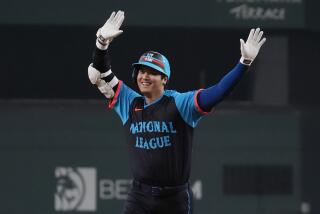All-Stars Will Be Playing for Keeps
- Share via
If Minnesota outfielder Torii Hunter robs San Francisco slugger Barry Bonds of a home run with another spectacular catch in this summer’s All-Star game, don’t expect Bonds to grab Hunter in a playful bear hug and lift him into the air the way he did during last summer’s game in Milwaukee.
Because if Hunter repeats that play at Chicago’s U.S. Cellular Field on July 15, it could cost Bonds and the Giants home-field advantage in the World Series in October.
Major league players Thursday agreed to a two-year experiment to give home-field advantage in the World Series to the league that wins the All-Star game, baseball’s response to last year’s debacle, a game that ended in a 7-7, 11-inning tie when both teams ran out of pitchers.
But this new proposal, which owners approved Jan. 17, could create as much controversy as the ending of the 2002 game and the never-ending debate over fan balloting.
“I disagree with it, completely and totally,” said Dodger pitcher Kevin Brown, a five-time All-Star. “I think it just takes away from the whole idea of what the All-Star game is about, which is letting the fans vote and letting it be an exhibition game. Now they’re trying to make it into something that it never has been.”
The Angels, who beat the Giants in Games 6 and 7 of last year’s World Series in Edison Field, voted against the proposal.
“I don’t agree with it,” Angel pitcher Jarrod Washburn said. “They’re changing the game because of a freak thing. Because it ended in a tie, now they have to change everything?”
The Dodgers will cast their official vote today, and player representative Paul Lo Duca said it will be in favor of the proposal.
“They needed to do something,” said Lo Duca, the Dodger catcher. “... We’ll try it for two years, and if it works, we’ll stay with it. It’s beneficial to us, too, because two more players are going to go, which is great.”
Lo Duca felt snubbed by Arizona Manager Bob Brenly last summer, but his All-Star odds, and those of every major leaguer, improve because the sides agreed to increase roster size from 30 to 32 and give players, managers and coaches a say on who makes the team.
Fans will select the starting position players. A separate ballot of players, managers and coaches will be conducted during the final week of fan balloting to determine nine additional position players in the American League and eight in the National League, as well as eight pitchers in each league.
If that vote has the same winner as the fan vote, the second-place finisher will make the team. The All-Star managers, Mike Scioscia of the Angels and Dusty Baker of the Chicago Cubs, will select the rest of the team, in consultation with the commissioner’s office. Each roster must include 12 pitchers.
All teams will still be guaranteed at least one All-Star, no pitcher will be required to throw more than three innings, and all starting position players must get at least one at-bat.
In light of declining ratings for the game, Fox, baseball’s national network broadcaster, lobbied players to support the plan, which should bring more intensity to the game.
But at what cost? Since the start of the World Series in 1903, home-field advantage has alternated between the AL and NL.
“It’s a very touchy subject because home-field advantage is pretty big when it comes down to Game 7 of the World Series,” said Dodger right fielder Shawn Green, who played in last year’s All-Star game.
“Everything that happened last year [in Milwaukee], they’re just trying to sweep it under the rug. I’m curious to know what the fans really want out of the All-Star game. Do they want to see all the players play? Do fans really care who wins?”
Philadelphia Manager Larry Bowa hopes the change brings meaning back to a game that used to be hotly contested.
“Do they want a showcase? Then do what they’ve been doing,” Bowa said. “If they want intensity, then have it back the way it was played before, where you see Pete Rose knocking somebody into the stands, and the president of each league coming in and giving pep talks before the game. To me, that’s what it’s all about -- pride.”
*
Times staff writers Jason Reid and Bill Shaikin and Associated Press contributed to this report.
More to Read
Go beyond the scoreboard
Get the latest on L.A.'s teams in the daily Sports Report newsletter.
You may occasionally receive promotional content from the Los Angeles Times.







